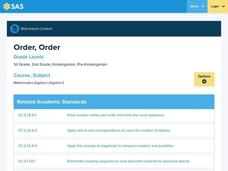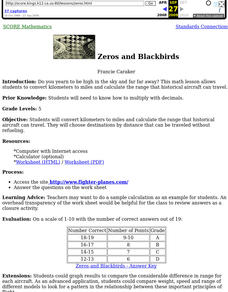Curated OER
Lesson 3: Number Sense
Learners solve word problems using number sense. They convert fractions to decimals and mixed numbers. Pupils determine if a given fraction is greater or less than another fraction, and order numbers on a number line.
Illustrative Mathematics
How Thick Is a Soda Can II?
Science, technology, and math come together in this one combination exercise. Analyzing the common soda can from both a purely mathematical perspective and a scientific angle allows for a surprisingly sophisticated comparison of...
Curated OER
Estimation and Approximation
In this estimation and approximation learning exercise, students determine the estimated value of given multiplication and division problems containing decimals. They round answers to the nearest whole number. This two-page learning...
Illustrative Mathematics
How Many Cells Are in the Human Body?
Investigating the large numbers of science is the task in a simple but deep activity. Given a one-sentence problem set-up and some basic assumptions, the class sets off on an open-ended investigation that really gives some context to all...
Pennsylvania Department of Education
Freckle Face
Students collect and record data. In this early data analysis lesson, students gather data about their partners face. As a class, the students use tally marks and pictographs to record the data and answer question about the information...
Curated OER
Earthquake Intensity
In this earthquake intensity worksheet, students will use the Modified Mercalli Scale and descriptions to complete 4 short answer questions.
Curated OER
Geography Worksheet
In this geography skills worksheet, students respond to 14 short answer questions by using maps and atlases. The maps and atlases are not included.
Pennsylvania Department of Education
Order, Order
Students use pictures to identify items as ordinal numbers. In this ordinal numbers lesson plan, students use the words "before" and "after" to identify the pictures as well.
Curated OER
Zeros and Blackbirds
Fifth graders convert kilometers to miles and calculate the range that historical aircraft can travel. They choose destinations by distance that can be traveled without refueling.
TeachEngineering
Teach Engineering: On Track Unit Conversion
Students use three tracks marked on the floor, one in yards, one in feet and one in inches. As they start and stop a robot specific distances on a "runway," they can easily determine the equivalent measurements in other units by looking...











